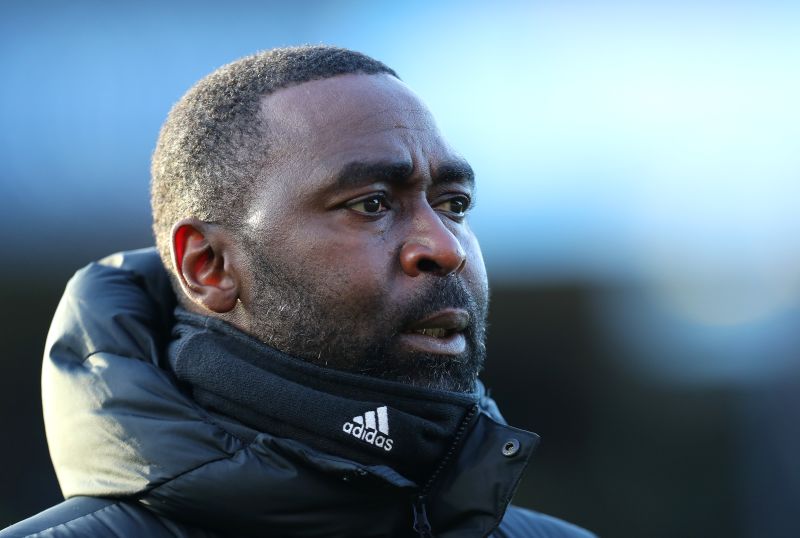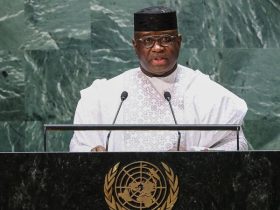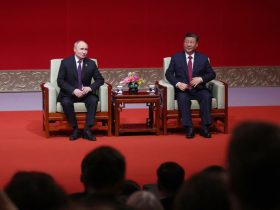Andy Cole had a distinguished soccer career, scoring crucial goals to win five Premier League titles and a Champions League trophy, but to him, his father Lincoln’s legacy “comes first.”
“I would say I know how tough it was for him, but I would never actually understand just how tough it was,” Andy said when reflecting on his father’s early experiences in the UK.
Between 1948 and 1973 when immigration laws changed, thousands of Commonwealth citizens emigrated to Britain to take up the UK government’s invitation to settle and help rebuild the country after World War II.
On one of the first voyages, 492 Caribbean islanders onboard the HMT Empire Windrush arrived in the UK on June 22, 1948. That generation of immigrants became the namesake of that ship, and their arrival date is now celebrated as Windrush Day.
Cole’s father, who arrived in the UK in 1957, was a coal miner at the Gedling mine in Nottingham between 1965-87, his son detailed. Coal mining was essential work, with coal required to power the country’s core industries in steel, manufacturing and textiles.
Cole did not realize the importance of his father’s role until he passed away in 2022: “I now know just how revered my dad was for being one of the pioneers.”
As many of the Afro-Caribbeans who settled in Britain in this period, Cole detailed how his dad, who was born in Jamaica – part of the Commonwealth – faced explicit forms of racism.
Throughout the 1950s to the 1970s there were widespread anti-immigration movements, bluntly expressing opposition to the new settlers from across the Commonwealth.
Yet in the mining profession there was a visible change in the racial dynamics above ground compared to below in the pits.
“There was more camaraderie (…) because once you go down there, everyone’s black. Makes no difference. If there’s an accident, incident or whatever, everyone mucks in to look after that individual,” Cole revealed on the stories his father told him.
Once above ground again, Cole’s father learned that the status quo was re-established.
Historian Norma Gregory curated the Digging Deep: Coal Miners of African Caribbean Heritage exhibition in 2019, bringing the stories of Lincoln and others to life alongside the rest of Britain’s coal mining history.
More widely the Windrush generation’s impact has often been overlooked. Despite race equality think tank, the Runnymede Trust, releasing a 2019 report urging “Migration, Belonging and Empire” to be compulsory in British schools, the topic is not part of the UK national curriculum.
“If you look at some of these wonderful buildings that we have, do we actually forget where they came from?” Cole stated, referencing the importance British Afro-Caribbeans had in helping rebuild the country.
Back in 2018, in the midst of the UK government’s “Hostile Environment” approach to immigration, the Windrush scandal revealed that a lack of settlement documentation for members of the generation and their children meant some were threatened with deportation.
These documents were not necessary for them to settle legally prior to 1973. In response the government backed down on their immigration policies.
The UK government attempted to rectify this mistake by offering a compensation scheme in 2019 for people who had been wrongfully detained or deported. Although by November 2021, only 5% of those eligible had received compensation, according to a report from the House of Commons’ Home Affairs Select Committee.
“When the Windrush generation all started, they were all sold a dream,” Cole said.
“Thinking that they were going to come to England and it was kind of like it was paved in gold.
“Once they got in, (they) realized that wasn’t quite the case.”
‘You have to be two or three times better’
Due to the racism he faced, Lincoln urged his son not to pursue a career in football, instead encouraging him to play cricket, where Andy stated he could be “comfortable” due to a larger Black presence participating.
Cole recalled how his father would say “you have to be two or three times better than your White counterpart.”
Cole detailed how, in childhood, he did not realize the weight of his father’s words. Pursuing football ultimately worked out, winning nine major trophies in a 19-year career, scoring 187 Premier League goals in the process.
However, Cole says racist abuse and a lack of acknowledgement for his achievements meant that in adulthood, he recognized his father was right.
As a result, Cole says he advised his own son, Devante, a professional footballer for English League One side Barnsley, with similar words to those his father had given him.
“When things are going well, you’re one of us. When things go wrong and the shoe’s on the other foot, you’re a Black man.”
The most prominent example in recent years is the racist abuse Bukayo Saka, Jadon Sancho, and Marcus Rashford faced after they missed decisive penalties for England in the Euro 2020 final. Eleven of the perpetrators were arrested in August 2021.
Speaking on the inevitability of racist abuse that Black footballers face when missing penalties Andy outlined, “I think we’re just waiting, okay, what’s happening on social media? Because, you know, within a few minutes it’s going to happen.”
Racism continues to mire football. Outside of the UK, in recent months Real Madrid forward Vinícius Jr. and Inter Milan forward Romelu Lukaku have been subject to racist abuse from rival fans. The abusive fans have faced repercussions, with the respective Spanish and Italian football federations issuing full or partial stadium bans to the clubs.
In Vinícius’ case, Spanish authorities conducted several arrests and charged those involved with fines and stadium bans.
Cole urged two of football’s governing bodies, FIFA and UEFA, to take a harsher stance on racism, to ensure repeat scenarios are prevented, suggesting the two bodies currently seek to sweep racism “under the carpet,” with “a few words” or “a few banners.”
World football governing body FIFA reiterated their efforts to fight against all forms of discrimination and highlighted their newly formed anti-racism taskforce, which Real Madrid and Brazil star Vinicius has joined.
UEFA, European football’s governing body, acknowledged and valued Cole’s input, saying he is “a well-respected individual on and off the field, speaking out about this particular problem and generously offering assistance to find a solution. His willingness to share valuable experience and expertise on the matter will not be underestimated.”
UEFA also reiterated their longstanding commitment to fight discrimination.
Cole says he would “love” to have a role in one of football’s high offices, utilizing his experience and his defiant straight-talking nature to make a tangible difference inside and outside of the sport.
A clinical striker in his playing career, maybe one day Andy can transfer his wealth of knowledge to the boardroom.






